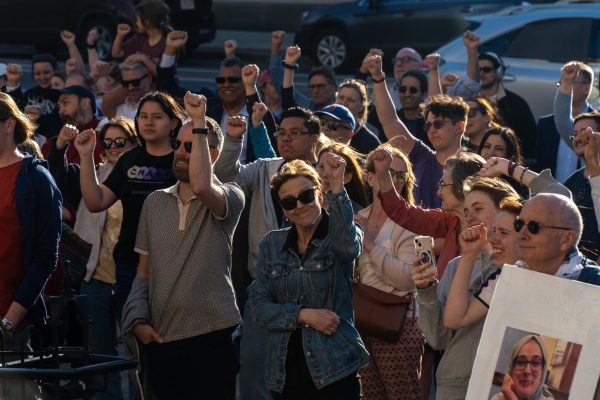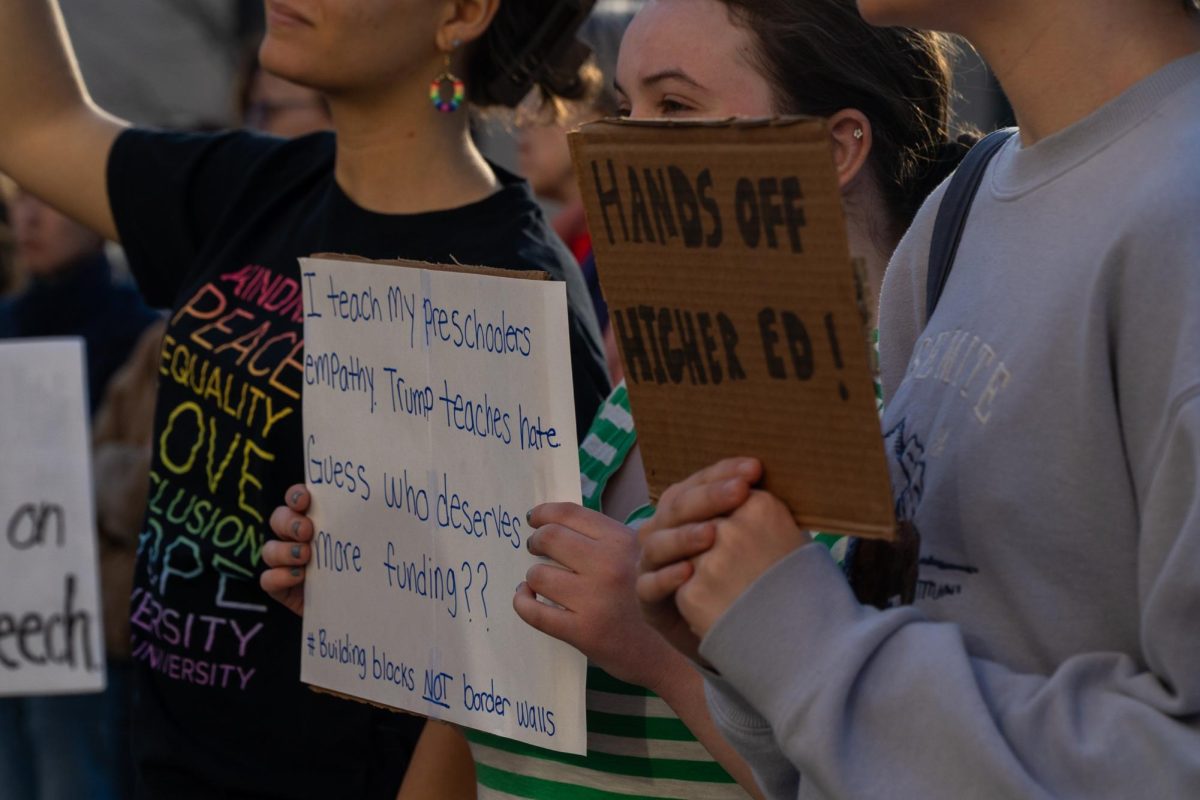Concerns over the Trump Administration’s policies towards higher education have prompted protests from members of Worcester’s colleges and universities. On April 17, around 40 Clark faculty held a pro-academic freedom rally in front of campus as part of the American Association of University Professors’ nationwide “Day of Action for Higher Ed.” Many held signs with statements such as “I Should Be Grading Right Now” and “Academic Freedom Makes America Great,” a reference to the Trump campaign slogan.
“If we don’t hang together, we’ll all hang separately,” Political Science Professor Robert Boatright explained.
Another professor summed up the rally’s message by saying, “We support the radical proposition that universities are good, actually.”
The protest came a few days after the Trump administration froze over $2.2 billion in grants and contracts with Harvard University. This was in response to Harvard’s refusal to acquiesce to administration demands to cut diversity, equity and inclusion, and to block the admission of international students with views hostile to “American values.” The Trump administration also requested that Harvard conduct an audit to assess “viewpoint diversity.” On April 21, Harvard launched a lawsuit against the federal administration. On Sept 3, a judge ruled in favor of Harvard, ordering the Trump administration to reinstate the funds it had withheld. Before this ruling Harvard and the Trump administration were reportedly nearing a deal which would have the university pay $500 million, and in return, the administration would reinstate federal funding. The status of this reported deal in the wake of the Sept 3 ruling was not immediately clear.
Earlier this year, the Trump Administration’s announcement of grant freezes resulted in “panic and confusion” at Clark and other institutions across the country.

According to Clark administrators, while they have not received any individually targeted threats from the Trump administration akin to those directed at Harvard, there have been instances of grants being revoked here at Clark.
“The actions that are being taken through the administration’s executive orders are instilling fear and confusion, and that is never the proper environment to do our best work or to move our country forward,” said President David Fithian in a statement regarding a letter from the American Association of Colleges and Universities (AACU) which he signed onto alongside 663 other heads of higher education institutions. The letter states that, while reform and oversight can be legitimate, “we must oppose undue government intrusion in the lives of those who learn, live, and work on our campuses.” They also write that the current actions towards higher education amount to “unprecedented government overreach and political interference.”
Fithian stated that, while higher education is not exempt from scrutiny, “what is problematic is dictating to colleges and universities how we should think, how we should teach, what we should research, and how we should act as if there is only one ‘right’ way to do that. The statement we have shared is a call to work together, use restraint, and adhere to fair, reasonable process.”
When asked if Clark is prepared to fight any direct ultimatums—should they receive any—and to protect faculty and staff from threats to academic freedom, the administration pointed towards the statements they’ve endorsed publicly.
On April 23, over one hundred higher education professors, students, professionals and members of the public gathered at Worcester City Hall to protest the Trump administration’s actions towards higher education. Among the speakers were individuals from Clark University, Assumption University and UMass Chan Medical School. Faculty from other institutions, such as Worcester Polytechnic Institute and College of the Holy Cross, were also in attendance. The protest, titled “Knowledge is Power,” was organized by Clark University Professor and Head of Faculty Kristen Williams.
Also present were local officials, including Worcester City Council Vice Chairman and current mayoral candidate Khrystian King, as well as members of the Clark administration, such as President David Fithian, Provost John Magee, and Dean of the College Laurie Ross.
Three professors from UMass Chan Medical School spoke about how research done at Worcester institutions improves lives and explained how attacks have been directed towards this research. Professor Sean Ryder noted that despite courts having blocked the federal government from cutting some grants, federal agencies have instead canceled the review of grants as a loophole to the same effect.
Clark Professor Tim Downs addressed the crowd to highlight a research project under his purview that had been impacted. The project, titled “Hopeful Future”, related to issues of water scarcity and the impacts on health, agriculture, human well-being, ecosystems and the economy. According to Downs, “At 5:30 pm last Friday… ‘Hopeful Future’ was abruptly terminated.” Downs quoted National Science Foundation administrators as saying that the project “no longer aligns with national priorities.”
While there was seemingly alignment among attendees throughout most of the rally, disagreements arose between Clark students/faculty and administrators regarding the correct way to respond to these threats.
Devin Moss, a Clark student and aspiring Worcester Public Schools teacher, commended university presidents for signing onto the AACU letter, but said that this wasn’t enough. She emphasized the need for collective action and resistance. “Let’s imagine what higher education could be, what it should be, and fight for that,” said Moss during her remarks.
Joseph Corrazini, Clark University’s Vice President for Government and Community Affairs, spoke about the important power of education—citing his own journey from public housing to becoming vice president of a university as evidence of this power. He warned that there have been proposals to cut Pell grants, subsidized loans, and work study grants, the latter of which he said was instrumental in his own college journey.
After Corrazini highlighted the importance of D.E.I., a Clark student in the crowd shouted, “What about the Office of Diversity Equity and Inclusion?”, an apparent reference to the elimination of Clark’s dedicated Vice President and Chief Officer of Diversity, Equity, and Inclusion and restructuring of D.E.I. at Clark.
“I’m going to be honest, I think a lot of the leaders in the institutions that we have our names next to on the program for today are not prepared to step into the leadership we need right now,” said Professor Cara Berg Powers, a professor in Clark’s Department of Education. “Closing D.E.I. offices or pretending we are not liberal arts or moving away from humanities or changing the words we use to describe the necessary lifesaving work we do will not take us out of their crosshairs. It will only make it easier for them to pick us off one at a time.”
Another speaker who agreed that acquiescence was not the correct approach was State Senator Robyn Kennedy, who described herself as a “proud graduate of Assumption University and Clark University.” Additionally, Kennedy emphasized the importance of this issue not just at the federal level but at the local level as well.
“We can’t ignore the fact that so much of the rhetoric, so much of the attack on higher education that we hear at the federal level is right here in our community. Municipal elections are coming up, my friends. All politics are local.”
Thank you to Sam Espach, Effie Hossfeld, and Gabe Schmick for helping with this article.

